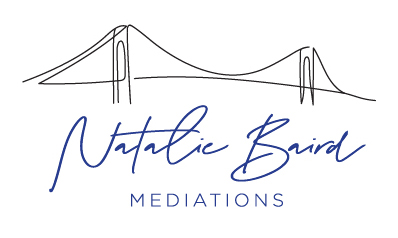At this time Natalie is offering mediation services only

You and your spouse are looking for a divorce. As such you are probably looking for a divorce mediator. Natalie Baird, from Natalie Baird Mediations, is a Board Certified Attorney and a Supreme Court Certified divorce mediator. She is one of the few divorce mediators in the entire Tampa Bay area that conducts virtual mediation. A virtual mediation is an alternative to in-person divorce mediation, conducted completely online using video conferencing. You can use your video-enabled desktop computer, laptop, tablet, or cell phone.
As your divorce mediator in Tampa, Florida, Natalie Baird functions as a neutral third-party to help you and your spouse come to an agreeable divorce. Tensions between divorcing spouses can be high, but as an experienced divorce mediator, Natalie will help the two of you communicate respectfully.
There are usually a few questions that people ask when considering a divorce and divorce mediation. Below are some answers to some common questions. If you would like more information please give us a call or fill out the form to the left.
What happens at a divorce mediation?
A divorce mediator’s job is to coordinate the debate between divorcing spouses. The purpose of mediation is to come to an agreement together, rather than appearing before a judge to solve differences. Most mediations are successful and decisions are made outside of a court hearing.
At this time Natalie is offering mediation services only
What are we going to talk about during the mediation?
Of course, there are some important issues to address during a divorce mediation in St. Petersburg, Tampa, or Clearwater. These issues can range from children and child support, co-parenting, real estate, shared personal belongings, and debt.
What do I need to prepare for a mediation?
If you are not on speaking terms with your spouse, first try to understand this may be stressful for both of you. Natalie Baird Mediations strives to work with both of you so that there is mutual respect and good communication.
You will need to begin gathering your financial information including W-2s, investment information, and real estate documentation from the Tampa Bay area, etc. Natalie will provide a full list of documentation that you will need for your personal situation.
Natalie Baird Mediations in Tampa can assist you with your divorce, no matter how complicated or challenging. For more information on virtual divorce mediation, please fill out the form to the left or you can give us a call at 813-440-9975.
Who Controls the Process
Collaborative:
You and your spouse control the process and make final decision
Litigation:
Judge controls process and makes final decisions
Degree of Adversity
Collaborative:
You and your spouse pledge mutual respect and openness.
Litigation:
Court process is based on an adversarial system
Cost
Collaborative:
Costs are manageable, usually less expensive than litigation; team model is financially efficient in use of expert
Litigation:
Costs are unpredictable and can escalate rapidly including frequency of post-judgement litigation
Timetable
Collaborative:
You and your spouse create the timetable
Litigation:
Judge sets the timetable: often delays given crowded court calendar
Use of Outside Experts
Collaborative:
Jointly retained specialists provide information and guidance helping you and your spouse develop informed, mutually beneficial solution
Litigation:
Separate experts are hired to support the litigants’ positions, often at a great expense to each
Involvement of Lawyers
Collaborative:
Your lawyers work toward a mutually created settlement
Litigation:
Lawyers fight to win, but someone will lose
Privacy
Collaborative:
The process and discussion or negotiation details are kept private
Litigation:
Dispute becomes a matter of public record and sometimes media attention
Facilitation of Communication
Collaborative:
Team of collaborative practice specialists educate and assist you and your spouse on how to effectively communicate with each other
Litigation:
No process designed to facilitate communication
Voluntary vs. Mandatory
Collaborative:
Voluntary
Litigation:
Mandatory if no agreement
Lines of Communication
Collaborative:
You and your spouse communicate directly with the assistance of members of your team
Litigation:
You and your spouse negotiate through your lawyers
Court involvement
Collaborative:
Outside court
Litigation:
Court-based
